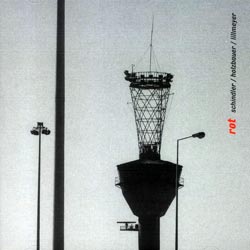
There comes a time where, when confronted by John Cage, George Crumb or Derek Bailey's extended performance techniques, a young musician decides "I can do that". After several misguided compositions and hours of aimless floundering, he or she relents: this is something one might be able to achieve only after a sincere lifetime of dedication. Fortunately, guitarist Harald Lillmeyer, cellist Margarita Holzbauer and wind player (soprano sax and bass clarinet for this recording) Udo Schindler persevered in this sonic realm — one riddled with cliché and gambit — to achieve mastery over this advanced language.
Rot t, if you haven't guessed by now, is saturated with the trio's ability to unlearn traditional tactics (which must be hard, as all are award winning, formally trained veterans) and speak in other-worldly tongues. Similar to a Paul Klee image (i.e. The Tightrope Walker, Reconstruction t), the sophisticated nature and sublime, often spiritual, expression in these works isn't noticeable at a CD-skipping glance. However, an examination of the subtle internal critique and connectivity — personally and globally from artist to artist, track to track — reveals the prowess of this Tower of Babel. On "4:56" (track one), Holzbauer introduces the program with idiosyncrasy (a lyrical dip almost resembling a melody) and the most base of extended techniques, the sul ponticello t. Immediately, she objects by twisting her line with scratchy bowing, microtonality then hyperactivity. Schindler and Lillmeyer respond with the visual equivalent of controlling another's shadow, pulling the cellist's (ahem) strings via sly contortion and rumbling echo. The piece burgeons as Schindler moves to the foreground with fey, sustained baritone notes that cadence in harmonics; Lillmeyer opens his electronic tool kit and gently chafes his axe with bit-reduced filters. As clamorous as this appears on paper, the trio opts to garner attention, not through screaming, but by demanding the listener lean in (and rewind) to perceive the murmur. In other words, rot is more likely to push you into a lucid trance than cause ear fatigue.
By the same token, the fourth member of the group, silence, plays an indispensable role in the success of these pieces. Even at their relative loudest on the bent-pitch drones of "2:14" (track four), the wah-wah infested, bow-bouncing "1:49" (track seven) and the clanking, banging feedback of the closer, "4:14" (track fifteen), the group employs the grandest of pauses, permitting 1) an enigmatic, breath-holding allure 2) distinction of formal and gestural shifts 3) the musicians to gather their thoughts on the moment and authorize movement towards the most exciting outcome (which, somehow, always pans out during this hour-long journey into sound).
Throughout the disc, the trio inhabits this similar spectrum, holding to a manifesto of sorts, yet never running out of ideas; the obvious understanding they have with their instruments allows for never ending jump-off points — even with modest creaks, twitches and simple finger placement. Coalescing screeches, skittles, broken strums, multi-phonic conversations, plucks, manipulations and whispered apparitions, the group gracefully chisels out a logical, organic and musical experience, a hand book for anyone who dares delve into this turf.
Comments and Feedback:



More Recent Reviews, Articles, and Interviews @ The Squid's Ear...


|

